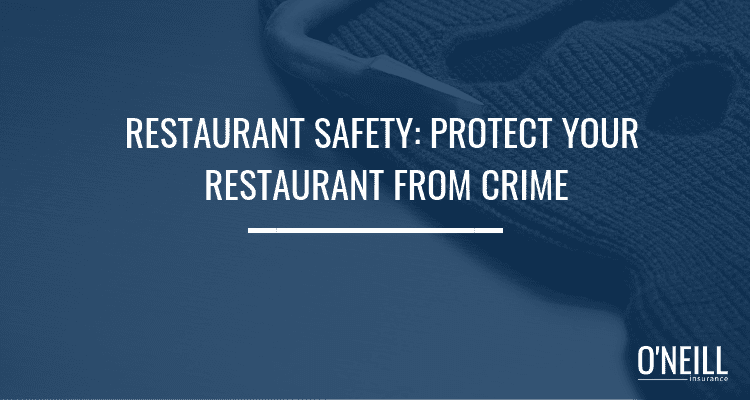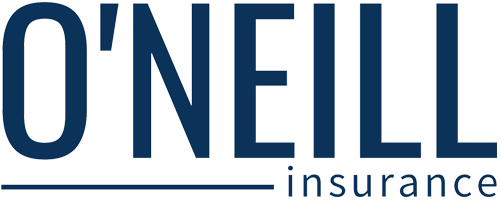
Restaurants can be easy targets for thieves.
Dim lighting, high traffic and fast-paced environments mean restaurant workers have trouble detecting and preventing theft.
Fortunately, there’s ways to improve security at your restaurant and avoid potential business interruptions.
Building Exterior Security for your Restaurant
Keeping your restaurant safe begins on the outside. Consider the following measures to keep your restaurant secure:
-
Lighting: It may seem simple, but lighting can have a large effect on building security, as criminals prefer to target places where their actions can easily be concealed by darkness. Make sure entrance ways, walking paths and parking lots are adequately lit. Motion-detecting lights are also helpful near doors that are not often used.
-
Locks: Again, a simple security measure that’s also essential. Front doors should always be locked during non-business hours. Any back doors that are used for emptying garbage or employee breaks should remain locked at all times. If a back door is used frequently, install a key card entry system on the door. With this method, lock the door and turn the key card system off after business hours to further increase security. After locks are installed, they must be checked frequently to ensure they stay in working order. Also, keep an eye on the condition of doors and make sure they’re sturdy and safely protecting your business.
-
Landscaping: A well-landscaped property can improve security at your restaurant in several ways. First, a well-maintained property gives the impression that the premise is under the supervision of attentive management, so show your presence by keeping the grounds well groomed. Also, just like poor lighting, an overgrowth of bushes and trees may create blind spots that can be used to conceal criminal activity. When choosing plants to be placed around windows and doors, pick ones that will remain relatively short, and trim them regularly.
-
Security cameras or on-site security personnel: Deciding to employ security guards or install security cameras depends on the individual situation. Often, such measures are not needed on the building’s exterior to provide the reasonable amount of security required for restaurant owners, but they can be beneficial in situations where a specific security concern may need extra attention. If the property is located in a high-crime area, security cameras or non-site personnel may be necessary.
-
Steel bars/bulletproof glass: Steel bars and bulletproof glass can be important security additions to your restaurant’s windows, and are helpful if your restaurant has a drive-thru.
Building Interior Security for your Restaurant
If a thief gains entry to the restaurant despite the exterior security measures, there are ways to deter the person once he or she is inside.
-
Alarm system: Install an alarm system that is monitored by a licensed security company. If there is a break-in, they will be notified and can dispatch the police to the restaurant to investigate. Make sure it is loud when triggered and is located where a thief can easily spot it.
-
Safes: Frequently deposit cash into a damage-resistant safe during hours of operation. Keep the safe out of sight and ensure only high-level employees know its location. Never leave the keys or code for the safe lying around. Safes that can only be opened at certain times add extra security.
-
Varying banking procedures: Thieves pay close attention to the routines of workers, so it’s important to frequently change how the restaurant does sensitive tasks such as banking and other cash handling activities. In this case, not having a routine is a positive thing.
-
Physical inventories: Either hire an outside company to perform physical inventories regularly or perform them in-house. If thieves see you physically counting merchandise, they are less likely to steal it.
-
Data security: Identity theft is a growing trend in restaurants. Thieves can place credit card skimming devices on point-of-sale (POS) terminals and collect a customer’s credit card information when the card is swiped by an employee. Employees that handle customer credit cards should be trained to detect any abnormal devices in and around POS terminals.
-
Never opening or closing alone: Make sure there is always more than one person opening or closing the restaurant. Before closing, check bathrooms and other areas where a person could hide to ensure thieves aren’t staying behind after hours.
-
CCTV: Install a closed circuit television (CCTV) system that is easily visible for both employees and customers. If thieves know they’re being watched, they are unlikely to steal from the restaurant. Make sure the video equipment is locked safely in a room at all times.
Keep your Restaurant Safe
It doesn’t matter if your restaurant is big or small—thieves will take advantage if you have lax security measures. In addition to these various security measures, training employees on how to spot potential thieves will go a long way to maintaining a successful restaurant.
There’s no doubt that managing restaurant safety can be complex, even with all of the right resources. Incidents still happen.
Crime Insurance for your Restaurant
With all of the proper security measures in place, your restaurant could still become victim to theft. For this reason, you may want to consider crime insurance for your restaurant insurance policy. For more information about Crime Insurance for Restaurants, visit our recent blog post: Top Benefits of Crime Insurance for Restaurants in Ohio
Next Step.
Let’s review your overall restaurant risk management and insurance program. I’m Pat O’Neill a risk advisor at The O’Neill Group, and I’d be happy to help you identify the risk exposures your restaurant faces, and secure for you the right restaurant insurance program. Call me at (330) 334-1561, email me at ptoneill@oneillinsurance.com or click here to schedule a time on my calendar that’s convenient for you to discuss cyber insurance.
Components of this article were adapted from Zywave. This is not intended to be exhaustive nor should any discussion or opinions be construed as legal advice. Readers should contact legal counsel or an insurance professional for appropriate advice.

